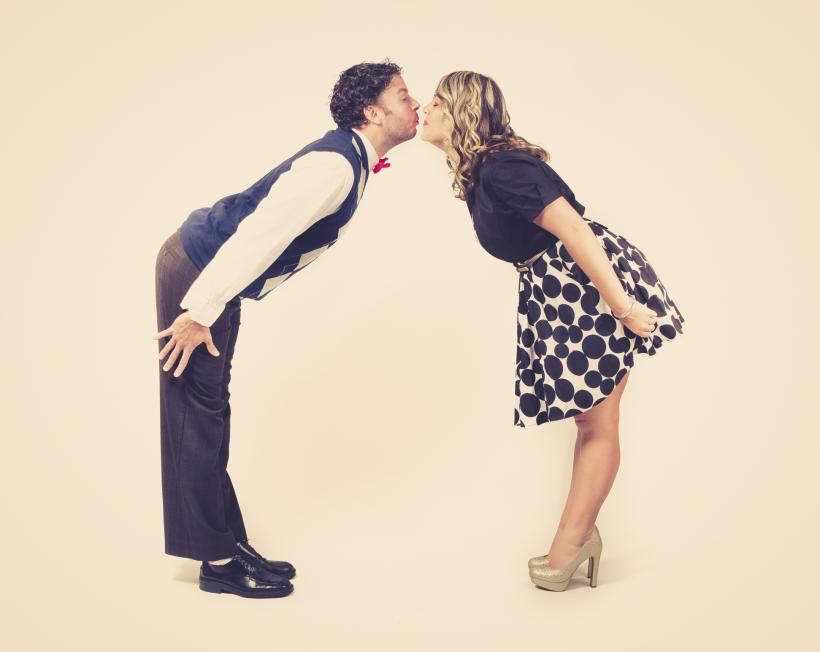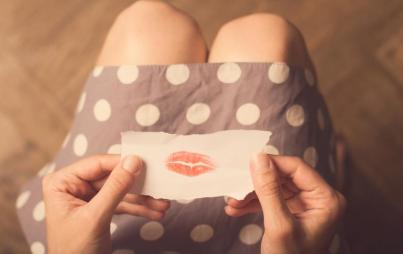
Credit: ThinkStock
I recently stumbled across this photography series—Pretty/Sloppy: 21 Kisses All Over The World—in the beautiful bowels of Medium and I was just like, bowled over.
Kissing is so weird you guys.

First there's the romantic kind: You take your face and mash it up against someone else's face and pass saliva back and forth and bite and suck and wiggle your tongue around and sigh into each other's mouth and make sucking noises with your lips. You grab the back of their neck and try to subsume their face with yours. It's like so animalistic and tender and hot and strange.
Then there's the maternal/paternal/fraternal kiss: There are few things more comforting and sweet than a kiss on the forehead. But like, what the hell is it? A warm sensation and smacking sound that lets you know, "hey, I'm here for you." There's also the cheek-kiss between friends because what says, "Oh hi, so happy to see you!" better than a wettish smacking noise on your face? Then there's the good 'ol fashioned hand-kiss which, arguably, is more than out of favor, but it's undeniably tres debonair. Yes, take my probably sticky paw and degrade yourself by putting your mouth on it. Weird.

Then there's the whole "I don't even know what I'm doing but I love kissing" thing that children inherently do. If I had a nickel for every time a child grabbed my face and gave me a renegade and unwarranted smooch just for the smell of it, I might be able to buy these shoes. And that would be awesome.
(Oh and of course we kiss inanimate objects all the time, but I'm not gonna even get into that.)
My point is, what is it all about? Why do we kiss? Why does it feel so good? And why is it both erotic as all get out and also like something we want our moms to do to us when we're sad? It's so confusing.
First? Some fun facts.
* The average human being will spend 20,160 minutes, or 14 days of their life, just kissing.
* A "passionate" kiss—where you like move your head all around and work your tongue—burns 2-3 calories per minute.
* 59 % men and 66 % of women said they've ended a budding relationship because of a bad first kiss.
* Romantic kissing is a part of more than 90% of human cultures.
* Kissing has been recorded for at least the last five millennia; rumor has it the earliest literate civilization in the world, Sumer (you know those folks in Mesopotamia) mentions both lip and tongue kissing in its poetry.

OK, so the theory among anthropologists is that kissing evolved—I'm so sorry—from what is called kiss feeding. Yes, the same process that mothers use to feed their infants, passing chewed up food from one wet hole to another. Scientists also believe that all the good vibrations wrapped up in feeling safe and fed that we establish with our mothers during nursing and feeding in turn gets projected onto our lovers.
It turns out that our lips are pretty important in all this kissing business.
"Well, our lips are packed with sensitive nerve endings, so even the slightest brush sends a cascade of signals and information to our brains, and the amount of our brains associated with lip stimulation—sort of the brain's-eye view of the body in terms of touch—is enormous. It's very disproportionate to other organs. So in that way our lips are our almost exposed erogenous zones, and they're really our way of interpreting the world. And for all sorts of reasons, we're drawn to another person's lips." — Sheril Kirshenbaum, author of The Science of Kissing, on NPR
Research has also shown that a "good kiss" immediately boosts certain neurotransmitters, including serotonin (which elevates mood and can spark "obsessive thoughts" about a partner), dopamine (responsible for craving and desire) and oxytocin, aptly called the "love hormone," which surges through our brains upon climaxing and triggers attachment between lovers.
Not surprisingly, smell is another huge facet when determining a good kiss or not. We're all on the prowl for scents with an MHC—major histocompatibility complex, which codes for immunity—which is distinctly different from our own. Genetic diversity and all that.
"We're really, really paying attention to what's going on," says Kirshenbaum. "Not always, again, consciously, but it matters. It's a really significant moment in our lives."

